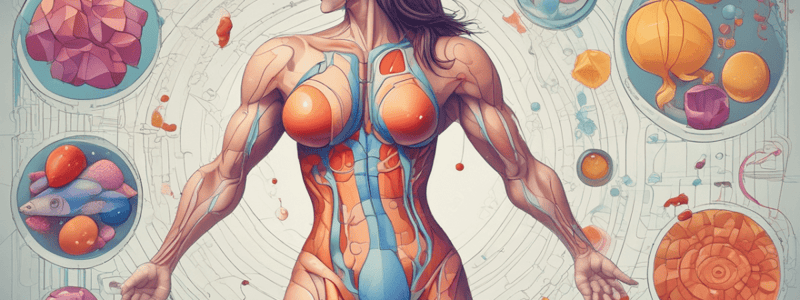Podcast
Questions and Answers
What is the primary function of proteins in the body?
What is the primary function of proteins in the body?
- To provide energy for bodily functions
- To store nutrients for later use
- To act as building blocks for body tissues and perform various other functions (correct)
- To regulate body temperature
What occurs when the intake of nitrogen is higher than the loss?
What occurs when the intake of nitrogen is higher than the loss?
- Positive nitrogen balance (correct)
- Negative nitrogen balance
- Nitrogen equilibrium
- Protein deficiency
Which type of protein provides all essential amino acids?
Which type of protein provides all essential amino acids?
- Incomplete protein
- Nonessential protein
- Complete protein (correct)
- Essential protein
What is the primary function of fats in the body?
What is the primary function of fats in the body?
Which of the following is a source of polyunsaturated fats?
Which of the following is a source of polyunsaturated fats?
What is the effect of replacing saturated fats with monounsaturated and polyunsaturated fats in the diet?
What is the effect of replacing saturated fats with monounsaturated and polyunsaturated fats in the diet?
Which of the following is a source of dietary cholesterol?
Which of the following is a source of dietary cholesterol?
Study Notes
Functions of Proteins
- Proteins are essential for building and repairing tissues, including muscles, skin, and organs.
- They play a critical role in enzyme and hormone production, aiding in metabolic processes and regulation.
Nitrogen Balance
- Positive nitrogen balance occurs when nitrogen intake exceeds nitrogen loss, indicating growth, recovery, or muscle gain.
- This condition is important during periods of growth, pregnancy, or after an injury.
Complete Proteins
- Complete proteins contain all nine essential amino acids necessary for human health.
- Common sources include animal products such as meat, fish, eggs, and dairy.
Functions of Fats
- Fats provide a concentrated source of energy, offering 9 calories per gram compared to proteins and carbohydrates at 4 calories per gram.
- They are crucial for absorbing fat-soluble vitamins (A, D, E, K) and support cell membrane integrity.
Sources of Polyunsaturated Fats
- Polyunsaturated fats are found in plant oils, fatty fish, walnuts, and flaxseeds.
- Omega-3 and omega-6 fatty acids are notable types of polyunsaturated fats beneficial for heart health.
Dietary Fat Replacement
- Replacing saturated fats with monounsaturated and polyunsaturated fats can lower LDL (bad) cholesterol and reduce the risk of heart disease.
- This dietary change is encouraged for better cardiovascular health.
Sources of Dietary Cholesterol
- Dietary cholesterol is primarily found in animal products, including meat, dairy, and eggs.
- It contributes to overall cholesterol levels, influencing heart health if consumed in excess.
Studying That Suits You
Use AI to generate personalized quizzes and flashcards to suit your learning preferences.
Description
Test your knowledge of amino acids and proteins, including their classification, functions, and importance in the human body. Learn about the role of proteins in building tissues, enzyme and hormone production, and immune response.




